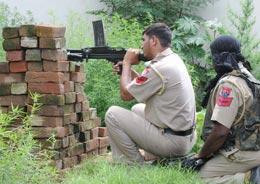Indian media suggest Khalistan link to attack

Indian intelligence agencies are looking at Canadian links to this week’s terror attack in Punjab that left seven persons dead, according to Indian media.
They believe the strike may have been in the works for more than a year as they had come across some intercepts, which suggested that Khalistani activists were working with Pakistani-based terror outfits.
In an intelligence advisory, the Indian spy agency RAW said that LeT (Lashkar-e-Taiba commander) Tufaili Nayat Mir had visited Canada and Germany to meet BKI (Babbar Khalsa International) operatives.
Lashkar-e-Taiba is one of the largest and most active terrorist organizations in South Asia, operating mainly from Pakistan.
Babbar Khalsa International, which is fighting for an independent homeland of Khalistan, is branded a terrorist organisation in many countries, including India, Canada, the United States and the United Kingdom
Four policemen, including a senior officer, were killed in last Monday encounter. So were three civilians and three terrorists. The cops didn’t have bullet-proof vests and fought with antique guns, while the extremists used sophisticated AK 47s.
The Research and Analysis Wing (RAW), India’s intelligence agency, had warned the government in a report submitted a month ago that there could be a terror strike, given the resurgence of radical outfits in various regions — particularly in Pakistan, Malaysia, Germany, France, Britain, Canada and the US.
Indian media reported that agencies allegedly have 'concrete' information that modules of Babbar Khalsa International (BKI), which have been sheltered by Pakistan as part of its plan to use terror groups to harass India, have been under immense pressure to attack Indian establishments with help from Lashkar-e-Toiba.
Noted Pakistan expert C Christine Fair from Georgetown University, Washington DC, said that there is credible information that Khalistani separatists in Canada, which has long been resident to Khalistan sympathisers, recently met ISI (Pakistan spy agency) representatives.
Last month, The South Asian Post reported that Indian police have alerted the RCMP to track a Canadian they allege is a key player in a terror plot that was to have involved transporting heavy ammunition by paraglider over the Pakistan-Indian border.
The plan was to be activated last February but was stopped with the arrest of one India’s most wanted men, Jagtar Singh Tara in Thailand, a few weeks earlier.
Tara, described as a terrorist with strong links to Canada, is accused of assassinating former Punjab chief minister Beant Singh in 1995.
The Canadian being tracked was identified as Harpreet Nijjar, a Canada-based Khalistani, according to The Times of India.
Releasing details of the spectacular plot, Indian police said that Tara planned to use a paraglider to dump heavy ammunition on the banks of the Ravi river, near the town of Gurdaspur, Punjab.
The flight was to take off from Narowal, a city in Pakistan about 5km from the Indian border.
According to a police report on the affair, Nijjar was to "especially come from Canada to Punjab" to retrieve the dumped ammunition.
"Nijjar was to only follow the satellite coordinates to collect the ammunition and hand it over to Fedayeen attackers from Kashmir," the police report said.
The plot was hatched between March and September 2014, with Khalistani supporters in Punjab reconnoitering the flight route and landing locations.
Indian police that the body of the paraglider was made of synthetic material and had excellent features to defeat Indian ground radars.
The report also said that Nijjar from Canada had been frequenting Pakistan to meet several Khalistani sympathisers and Pakistani spy officials from ISI.
The unveiling of the plot comes as Pakistan's military accused India's intelligence agency of whipping up terrorism in Pakistan, increasing tensions between the nuclear-armed rivals.
Pakistan believes India is supporting separatists in its resource-rich Baluchistan province, as well as militants fighting the state.
It also sees India as fuelling strife in the volatile city of Karachi.
India denies interference in Pakistan but accuses Pakistan of supporting militants who launch attacks in India and fight in the Indian state of Kashmir.
India has also accused Pakistan of backing the Taliban in Afghanistan. Pakistan denies those accusations.
Central agencies in India last month raised concerns with their Canadian counterparts about the civil disobediant activities of some groups who are still sympathetic to the creation of a Khalistan state.
The Indian intelligence wing RAW also raised the prospect of individuals operating in Canada at the behest of Pakistan’s spy agency ISI or the Inter Services Intelligence.
Britain's The Daily Mail reported last month, that ISI is using Sikh activists who are taking refuge in Pakistan to gather political support from their community in Canada with the hopes of keeping the concept of a Khalistan state alive.
An intelligence report accessed by The Mail Today on the activities of groups in Canada engaged in pro-Khalistani support, says that Pakistan's ISI is compelling Sikh activists for anti-India activities.









